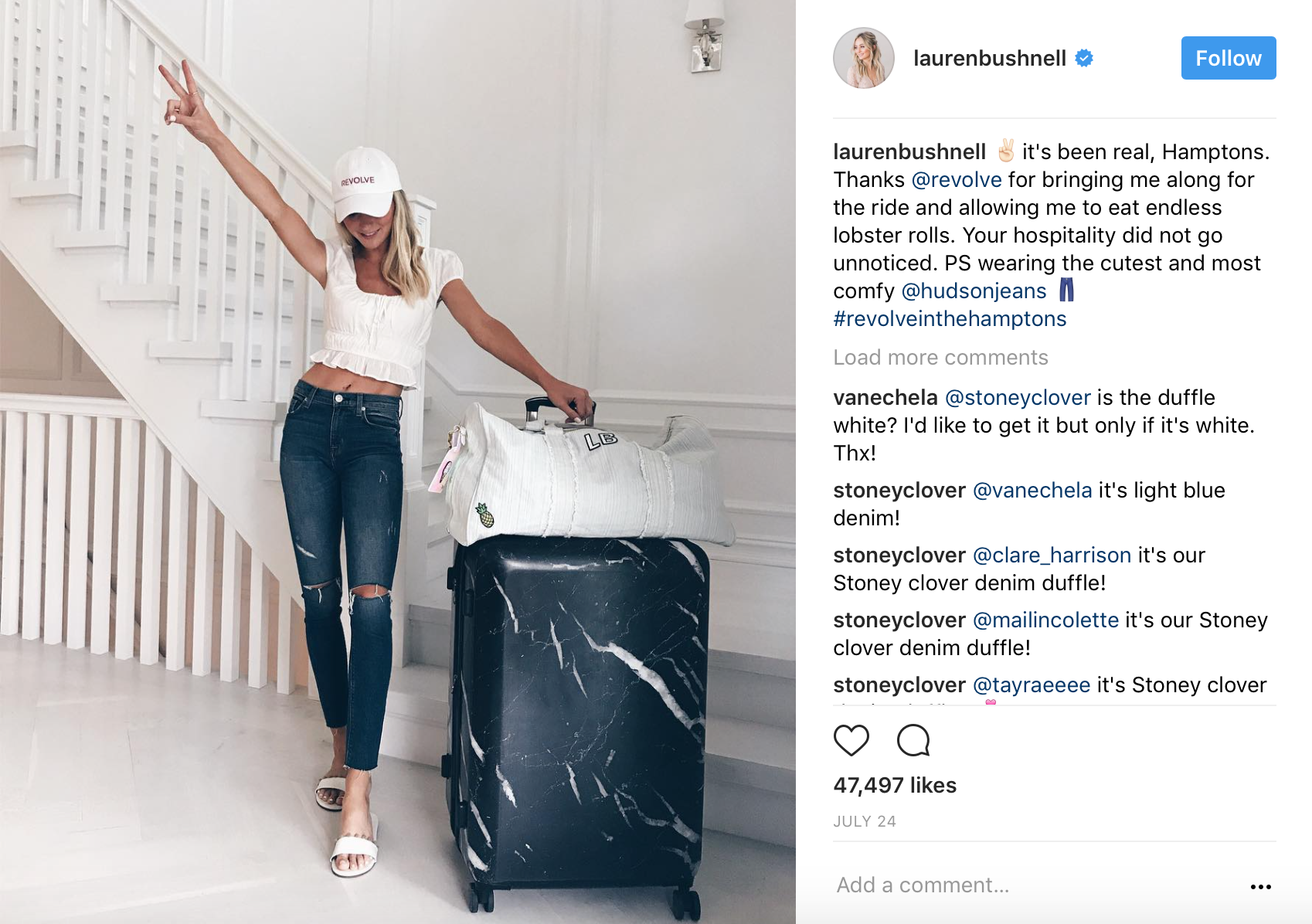
image: Revolve
For Revolve – which was founded in 2003 by Michael Karanikolas and Michael Mente, both of whom have tech, not fashion, backgrounds – influencer marketing is big business. As WWD reported in October, up to “70 percent of current overall sales at revolve.com are driven by an influencer. And based on projections that Revolve is on track to surpass $1 billion in retail sales this year, that means that content creators could be responsible for up to $700 million of this year’s revenue.”
There is one thing that might be a bit off, though. The Federal Trade Commission (“FTC”) has long required advertisers and promoting parties, alike, to disclose material connections so that consumers can make purchasing decisions accordingly – and such guidelines extend to the web and social media, alike. This means that if a brand or retailer compensates an influencer to post about it or its products online, or to tag its products on Instagram, for example, that must be clearly indicated. #Ad and #Sponsored are common examples of such disclosure language.
Similarly, if an influencer is gifted products from a brand or retailer (even if the brand/retailer does require or pay for endorsement in exchange) and the influencer does, in fact, post a photo or video that depicts the product, that connection must also be disclosed. The logic holds true when a brand/retailer pays for an influencer’s trip to attend an event, such as Coachella or a fashion week show. Still yet, the FTC has stated that affiliate-type relationships – aka when an influencer earns a commission by promoting others’ products, usually by including a link in their bio line on Instagram, for example – must also be disclosed.
This is where Revolve comes in. A noteworthy number of its’ influencer posts do not bear disclosures and this could prove legally problematic.
According to a source of Fashionista, though, there is a lot more going on here. As the site stated last summer, “In addition to taking care of their travel and accommodations, Revolve gifted each influencer [including Natasha Oakley, Danielle Bernstein, Chiara Ferragni, Eleanor Calder, Kristina Bazan, Negin Mirsalehi, and Camila Coutinho, among others] with a sizable clothing credit — a source close to the participating talent tells us $2,000 is standard — in addition to paying his or her appearance fee.”
In exchange, “Each guest was required to post using the designated hashtags twice per day.”

image: @Laurenbushnell
It is worth noting that the form that the relationship between Revolve and its influencers takes – whether it consists of straightforward payouts, affiliate-type situations, lent or gifted garments and accessories that are available for sale on the Revolve site, or some combination of these different instances– that does not matter. The FTC has said that all of these situations likely fall under its purview and thus, require disclosure.
While most influencers making use of Revolve’s various hashtags and brand-specific tags uniformly fail to include disclosures, Chiara Ferragni, the mega-influencer force behind Blonde Salad has provided some insight into the Revolve model by way of her disclosures. Ever since Ferragni was on the receiving end of a letter from the FTC earlier this year, she has changed her ways to an extent and the results have been quite telling.
Posts that previously did not include disclosures now come with #ad language. Some of the newly-disclosured posts include Revolve-related hashtags and other brand-specific tags, such as #RevolveAroundTheWorld, and now include #Ad disclosures, thereby proving that she – and many others – are being compensated in some form.
And yet, as indicated by Mike Froggatt, director, intelligence, at digital research firm L2, among the Instagram posts from a handful of super influencers, including Chiara Ferragni; Aimee Song of Song of Style; Amber Clark of Barefoot Blonde; Arielle Charnas of Something Navy; Christine Andrew of Hello Fashion; Danielle Bernstein of We Wore What; Julia Engel of Gal Meets Glam; Julie Sariñana of Sincerely Jules, and Rachel Parcell of Pink Peonies, of the 142+ instances in which posts included Revolve hashtags — #revolveinthehamptons, #revolvefestival, #hotelrevolve, #revovlearoundtheworld, etc., very few are indicated as sponsored.
“Of these Revolve-related posts, only nine were identified as an ad — Song with six of these, Bernstein with two and Ferragni with one — even though the majority of these influencers work closely, and in a paid capacity, with the retailer,” Froggatt told WWD.
Worthy of Awards?
It is against this background that Revolve has announced its first-ever #RevolveAwards initiative. To “celebrate the year’s highlights in fashion, beauty and of course, influencers,” per WWD, Revolve has put forth a list of award categories – such as YouTube Channel of the Year; Best Influencer Brand; BFFs of the Year; Best Beauty Influencer; Brand of the Year; #Couplesgoals of the Year, and Influencer of the Year – and has called on the public to cast their votes … on the e-commerce retailer’s website, of course.
An influencer-specific awards event makes a lot of sense for Revolve. What does not necessarily add up is why Revolve – which clearly places significant value on and derives striking profits from influencer marketing – is not working a whole lot harder to ensure that its influencers abide by federal truth in advertising guidelines.
Unsurprisingly, many of Revolve’s nominees for its inaugural awards – which include Archive Shoes by Danielle Bernstein, Chiara Ferragni Collection by Chiara Ferragni, Gisou by Negin Mirsalehi, Same Swim by Shea Marie and Shop Sincerely Jules by Julie Sariñana in the Best Influencer Brand category, for instance – are often some of the most common flouters of the FTC’s guidelines.
This is something that Revolve might want pay attention to before its inaugural awards event and well, something to be cognizant of in general, as the FTC continues to focus on the fashion industry and the influencers in its ranks.







